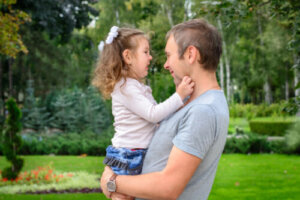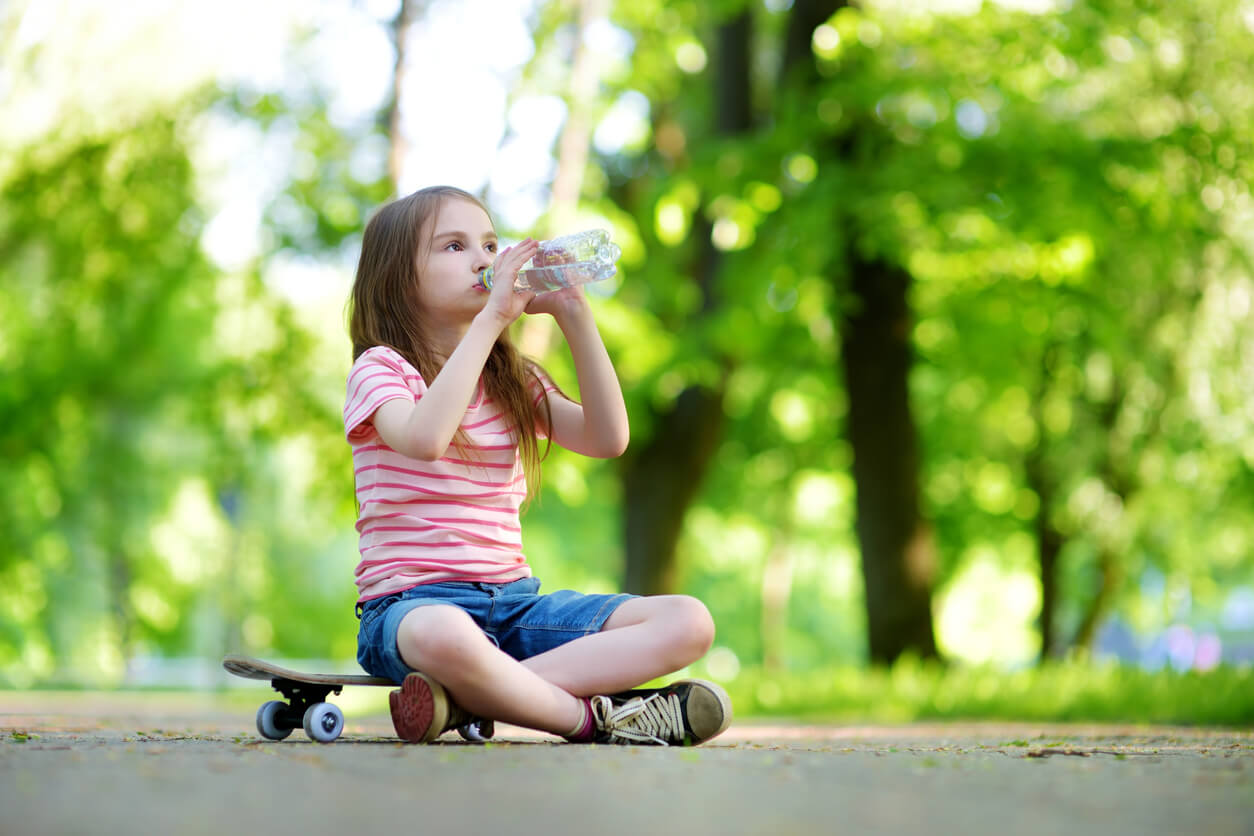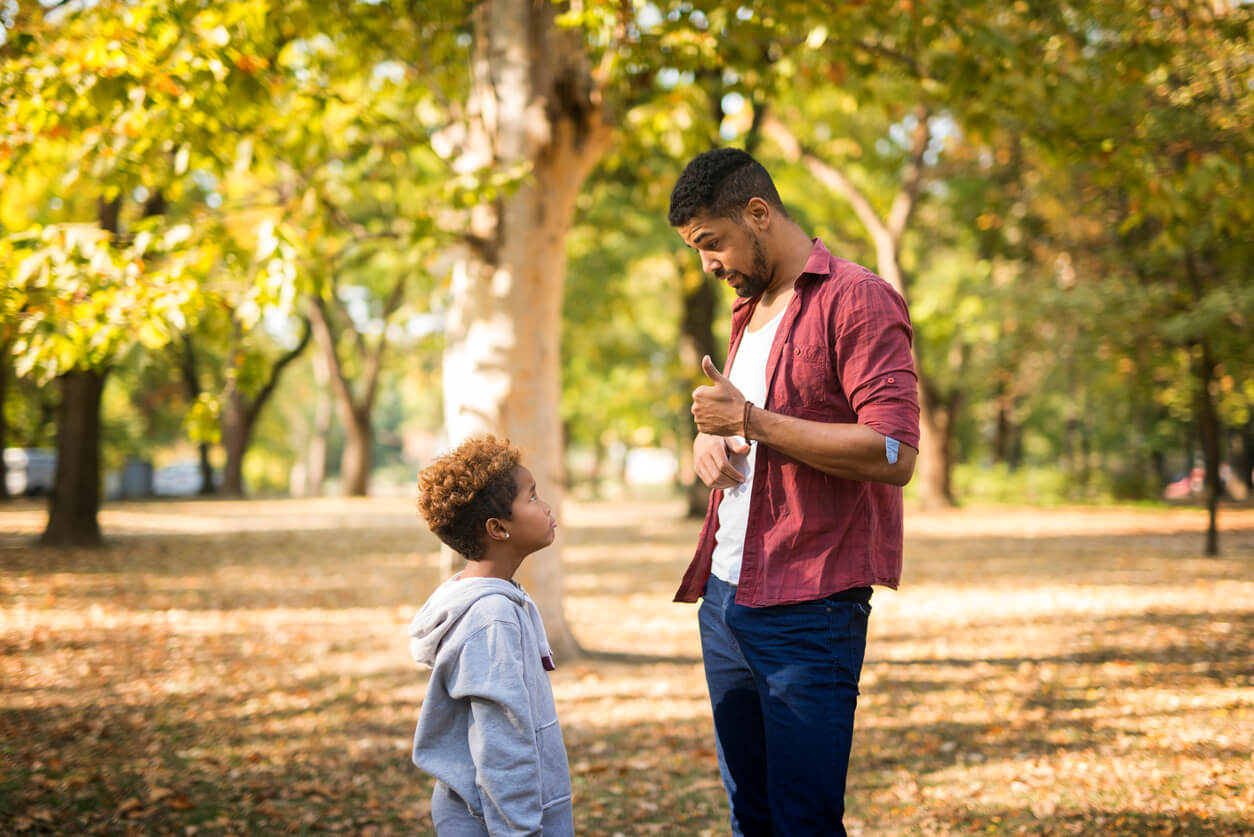10 Mistakes When Going to the Park with Your Children


Written and verified by the psychologist Maria Fátima Seppi Vinuales
Going outdoors is one of the moments that children love the most. These outings allow them to let off steam, interact with their peers, be in contact with nature, and have fun. However, when going to the park with our children, we tend to make some mistakes that can spoil this plan. Let’s see how we can avoid them.
10 mistakes when going to the park with your children
Some mistakes you could make when you go to the park with your children can make a fun afternoon end in tears and anger. Therefore, we’ll tell you what the most common mistakes are so that you can avoid them and have a good time with your family.
1. Neglecting and not paying attention to your kids
Maybe your child’s a little older and can be alone on the playground or on the slide. However, sometimes we abuse that confidence and security, immerse ourselves in the digital world, and stop paying attention. It’s not about being on high alert all the time, but being able to anticipate danger or risks that children aren’t able to perceive.
2. Letting other older children take care of your child
This often happens when visiting the park with older siblings or cousins. On these occasions, we delegate responsibility to the older child when it’s not their responsibility. Not only are we giving putting an unnecessary and inappropriate burden on their shoulders, but we’re also preventing them from enjoying the place and the moment.

3. Not bringing food and water
Especially in times of high temperatures, it’s important to stay hydrated. Therefore, carrying water is essential, especially for children. In addition, you should bring some food or money to buy on the spot. Fruits are an excellent option for those hot days.
4. Insisting on going to the park despite high temperatures
When the heat’s very intense, going to the park may not be the best option, as the children will have to stay in the shade and won’t be able to enjoy the place. Sometimes it’s best to think of an alternative plan. If we go anyway, we should bring sunscreen and a hat. It’s also a good option to have another change of clothes.
5. Not making prior agreements
Although we must allow children to play as they please, we must also give them instructions and help them understand that they must respect them for their own good. In this regard, we can tell them that they can play within a certain perimeter or space, that they can’t leave without us accompanying them, that they shouldn’t go with strangers, and that they have to take care of their belongings, among other rules. If we talk about these rules at home, coexistence in the park will be easier for everyone and we’ll avoid having a bad time.
6. Turning a fund time into a routine visit
Many times, tiredness or reluctance leads us to forget that the time in the park should be for enjoyment. Therefore, we make the plan, but it loses its meaning. We carry it out almost as an obligation or a routine activity. The worst thing is that instead of encouraging play and enjoyment together with our children, we tend to keep an eye on the clock waiting for it to be time to go home.
7. Making games for adults
Sometimes, we make the mistake of imposing our own rules and ways of playing. Instead, the best thing to do is to allow children to function with their own logic, to do and undo as they please. We must accept that at certain ages, there are no right or wrong ways to play, but rather the goal is to let curiosity wander.
8. Intervening continuously in interactions with other children
On the street, children learn to defend themselves and develop social skills. Therefore, if your child interacts with others, before intervening, it’s advisable to evaluate the situation calmly. Sometimes we jump the gun and overprotect them. By doing so, we take away the opportunity for them to learn to resolve their own issues.

9. Not intervening if there is a serious problem
Now, the previous point doesn’t mean that we should never get involved. There are times when the situation gets out of control and children start to have a hard time. Suddenly toys are flying, punches are thrown, or hair is pulled. It’s important that we’re able to set a limit and make our children feel that we’re there for them to protect them and offer security.
10. Sharing food or drinks with other children
Perhaps we prepared a snack for our children, and they met other kids at the park. We kindly offer them something to eat or drink. However, beyond good intentions, this isn’t a good idea. This is because we don’t know the child and, therefore, we don’t know if they have any allergies or if their parents restrict certain foods. In this case, another option is to ask their parents if we can share with them.
You may be interested in: 6 Things to Pack for a Family Outing
A moment of enjoyment
Besides the activities we carry out at the park with our children, the most important thing is that we can connect with them. We must respect that time of play, adventure, and exploration while offering them protection and care. But at the same time, we also have to learn to let go and not be so dependent that we prevent them from enjoying or relaxing.
It’s obvious that every adult faces their own fears and insecurities when in charge of a child. In this regard, there are those who feel very nervous about the possibility of being hit or something bad happening to them, as well as those who overestimate their capabilities and forget that they’re children. It’s important to be able to know ourselves, recognize these emotions, and learn to manage them. We must allow ourselves that search between freedom and supervision and try to find a balance.
Going outdoors is one of the moments that children love the most. These outings allow them to let off steam, interact with their peers, be in contact with nature, and have fun. However, when going to the park with our children, we tend to make some mistakes that can spoil this plan. Let’s see how we can avoid them.
10 mistakes when going to the park with your children
Some mistakes you could make when you go to the park with your children can make a fun afternoon end in tears and anger. Therefore, we’ll tell you what the most common mistakes are so that you can avoid them and have a good time with your family.
1. Neglecting and not paying attention to your kids
Maybe your child’s a little older and can be alone on the playground or on the slide. However, sometimes we abuse that confidence and security, immerse ourselves in the digital world, and stop paying attention. It’s not about being on high alert all the time, but being able to anticipate danger or risks that children aren’t able to perceive.
2. Letting other older children take care of your child
This often happens when visiting the park with older siblings or cousins. On these occasions, we delegate responsibility to the older child when it’s not their responsibility. Not only are we giving putting an unnecessary and inappropriate burden on their shoulders, but we’re also preventing them from enjoying the place and the moment.

3. Not bringing food and water
Especially in times of high temperatures, it’s important to stay hydrated. Therefore, carrying water is essential, especially for children. In addition, you should bring some food or money to buy on the spot. Fruits are an excellent option for those hot days.
4. Insisting on going to the park despite high temperatures
When the heat’s very intense, going to the park may not be the best option, as the children will have to stay in the shade and won’t be able to enjoy the place. Sometimes it’s best to think of an alternative plan. If we go anyway, we should bring sunscreen and a hat. It’s also a good option to have another change of clothes.
5. Not making prior agreements
Although we must allow children to play as they please, we must also give them instructions and help them understand that they must respect them for their own good. In this regard, we can tell them that they can play within a certain perimeter or space, that they can’t leave without us accompanying them, that they shouldn’t go with strangers, and that they have to take care of their belongings, among other rules. If we talk about these rules at home, coexistence in the park will be easier for everyone and we’ll avoid having a bad time.
6. Turning a fund time into a routine visit
Many times, tiredness or reluctance leads us to forget that the time in the park should be for enjoyment. Therefore, we make the plan, but it loses its meaning. We carry it out almost as an obligation or a routine activity. The worst thing is that instead of encouraging play and enjoyment together with our children, we tend to keep an eye on the clock waiting for it to be time to go home.
7. Making games for adults
Sometimes, we make the mistake of imposing our own rules and ways of playing. Instead, the best thing to do is to allow children to function with their own logic, to do and undo as they please. We must accept that at certain ages, there are no right or wrong ways to play, but rather the goal is to let curiosity wander.
8. Intervening continuously in interactions with other children
On the street, children learn to defend themselves and develop social skills. Therefore, if your child interacts with others, before intervening, it’s advisable to evaluate the situation calmly. Sometimes we jump the gun and overprotect them. By doing so, we take away the opportunity for them to learn to resolve their own issues.

9. Not intervening if there is a serious problem
Now, the previous point doesn’t mean that we should never get involved. There are times when the situation gets out of control and children start to have a hard time. Suddenly toys are flying, punches are thrown, or hair is pulled. It’s important that we’re able to set a limit and make our children feel that we’re there for them to protect them and offer security.
10. Sharing food or drinks with other children
Perhaps we prepared a snack for our children, and they met other kids at the park. We kindly offer them something to eat or drink. However, beyond good intentions, this isn’t a good idea. This is because we don’t know the child and, therefore, we don’t know if they have any allergies or if their parents restrict certain foods. In this case, another option is to ask their parents if we can share with them.
You may be interested in: 6 Things to Pack for a Family Outing
A moment of enjoyment
Besides the activities we carry out at the park with our children, the most important thing is that we can connect with them. We must respect that time of play, adventure, and exploration while offering them protection and care. But at the same time, we also have to learn to let go and not be so dependent that we prevent them from enjoying or relaxing.
It’s obvious that every adult faces their own fears and insecurities when in charge of a child. In this regard, there are those who feel very nervous about the possibility of being hit or something bad happening to them, as well as those who overestimate their capabilities and forget that they’re children. It’s important to be able to know ourselves, recognize these emotions, and learn to manage them. We must allow ourselves that search between freedom and supervision and try to find a balance.
All cited sources were thoroughly reviewed by our team to ensure their quality, reliability, currency, and validity. The bibliography of this article was considered reliable and of academic or scientific accuracy.
- Meneses, Maureen, & Monge, María de los Ángeles (2001). El juego en los niños: enfoque teórico. Revista Educación, 25(2),113-124.[fecha de Consulta 29 de Septiembre de 2022]. ISSN: 0379-7082. Disponible en: https://www.redalyc.org/articulo.oa?id=44025210
- Larrabure, María Pilar; Paolicchi, Graciela La función del juego en la infancia y las concepciones de madres, padres y docentes sobre su incidencia en el desarrollo infantilLa función del juego en la infancia y las concepciones de madres, padres y docentes sobre su incidencia en el desarrollo infantil En: Anuario de Investigaciones, vol. XXV‚ 25. Facultad de Psicología. Universidad de Buenos Aires. [consultado: 29/9/2022] Disponible en el Repositorio Digital Institucional de la Universidad de Buenos Aires: <http://ppct.caicyt.gov.ar/index.php/anuinv/article/view/14387/45454575768304>
This text is provided for informational purposes only and does not replace consultation with a professional. If in doubt, consult your specialist.








